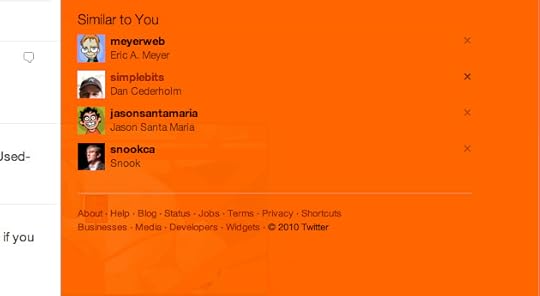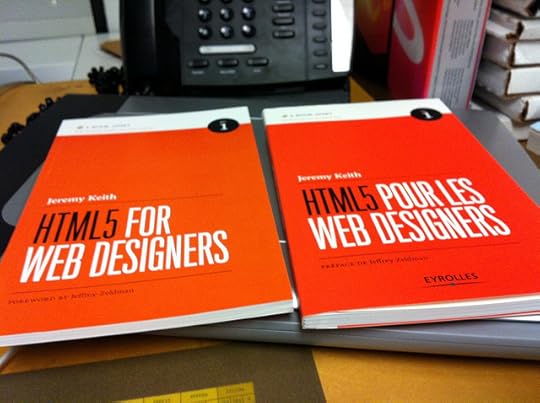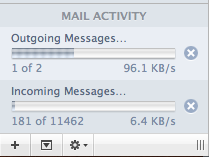Jeffrey Zeldman's Blog, page 89
October 26, 2010
BBEdit Revised, Reviewed.

I RECENTLY ATE dinner with a friend I hadn't seen in 20 years. If you are in a position to do likewise, I highly recommend the experience. So much had changed, yet so much was still wonderfully the same. We were still the same joyously creative young fools, yet time had seasoned us. No longer poking the world with sharp sticks, we had found a place in it. I was pleasantly reminded of this existentially thrilling encounter while opening a pre-release version Bare Bones Software's BBEdit 9.6 update—released to the public as of 12:19 EDT today.
A beloved and venerable HTML and text editor for Macintosh, BBEdit is tailored to the needs of web developers and designers who write their own code. Its no-frills interface consists of a document window in which you write your code; a side drawer that lists all pages you're working on, enabling you to navigate between them; a stack of buttons (many with drop-downs) you can push to perform tasks like choosing and inserting a DOCTYPE, wrapping chunks of copy in paragraph tags, checking syntax and links for errors, and more; and a report window where you can view your test results and correct your errors—released to the public just minutes ago.
Previous versions of BBEdit were updated with the precepts of Designing With Web Standards in mind, and the current version takes some of its feature cues from Jeremy Keith's HTML5 For Web Designers. (When I say the software takes its cues from Mr Keith's book, I mean that literally; Bare Bones Software head Rich Siegel and his team used HTML5 For Web Designers to help develop some of their testing suites.)
Given these antecedents, it's no surprise that the new version adds support for HTML5, including published element lists from WHATWG and W3C; CSS3 properties, including vendor-specific properties for Mozilla, Safari/WebKit, and Opera browsers; a new contextual code-hinting feature tied to your chosen doctype that includes as-you-type popups for allowed elements, attributes, and (in CSS documents) style properties; and Bare Bones's own offline validator (HTML 3.2 through HTML5, XHTML inclusive), baked right into BBEdit.
Using BBEdit 9.6 this morning, I was able to quickly update my site from XHTML 1.0 to HTML5. The syntax checker enabled me to use my preferred coding style (i.e. XHTML style) and the product identified outmoded attributes ("language=JavaScript") and elements ("rev"), enabling me to correct them right in the error report window. It took no time at all.
BBEdit 9.6 also found the errors in WordPress plug-ins like fbLike Button and TweetMeme Retweet Button, enabling me to make an informed decision to stop using the former plug-in and helping me edit the PHP files of the latter plug-in so that it now validates here.
BBEdit 9.6 also offers increased performance for several common
operations, including search, and includes several enhancements and
refinements, plus fixes for reported issues. Detailed information on
all of the changes and improvements in BBEdit 9.6 can be found on the Release Notes page.
After using the new version for two days, I am switching back to BBEdit as my full-time coding platform.
BBEdit 9.6 is available free of charge to all registered BBEdit 9 customers from the Bare Bones Software website on the BBEdit Updates page. For more information, or to download a fully functional demo, visit Bare Bones Software's site.

October 25, 2010
Making the web more awesome: Karen McGrane on the big web show this week
Karen McGrane, designer of The New York Times website and managing parter at Bond Art + Science is our guest on Episode #25 of The Big Web Show, taped live before an internet audience at 1:00 PM ET Thursday, 28 October at live.5by5.tv.
We will discuss running a design business, teaching UX and design, selecting employees and clients, business and creative processes, and the explosive web and interaction design scene in New York City, where Karen has long been a major player.
If the internet is more awesome than it was in 1995, Karen would like to claim a very tiny piece of the credit. For more than 15 years Karen has helped create more usable digital products through the power of user experience design and content strategy. Today, as Managing Partner at Bond Art + Science, she develops web strategies and interaction designs for publishers, financial services firms, and healthcare companies.
Prior to starting Bond, Karen built the user-centered design practice at Razorfish in her role as VP and National Lead for User Experience. Karen is also on the faculty of the MFA in Interaction Design program at SVA in New York, where she teaches Design Management, which aims to give students the tools they need to run successful projects, teams, and businesses.
The Big Web Show ("Everything Web That Matters") is recorded live in front of an internet audience every Thursday at 1:00 PM ET on live.5by5.tv. Edited episodes can be watched afterwards, often within hours of recording, via iTunes (audio feed | video feed) and the web. Subscribe and enjoy!

October 23, 2010
"Similar to You"
IN THE TRADITION of "People who bought 'Assmasters' also bought 'Assmasters II,'" Twitter has chosen four of my Twitter friends and is presenting them to me as being "Similar to You." Pray what does this odd-in-this-context phrase, with its "Related Products" vibe, mean? Does it mean if I like myself, I would also like these people? Surely not, for I already know that, as demonstrated by the fact that I follow them. Were they chosen for discussing similar subjects (e.g. design, web design, CSS, semantic markup)? Unlikely, as that would imply Google-like keyword data mining and analysis bordering on artificial intelligence.
Then, what? It can't mean people whose tweets resemble mine, as the Twitter writing style and frequency of the listed friends is purely their own. People with whom I have followers in common? That seems most likely, but it's just a guess.
I'm curious to know what Twitter and its new CEO (hi, Dick!) mean by this. What is the marketing purpose of this feature? Am I to view Twitter as an informal "personal brand analysis" service? That could be cool for me and for the four people who are "Similar" to me. But surely most users would be uninterested in such a service, unless, unbeknownst to me, nearly everyone who uses Twitter is a marketer who views it primarily as a channel. And most companies don't spend money developing long-tail features, of interest only to a tiny fraction of their users.
I love Twitter. I wish I'd invented it, and not primarily because if I'd invented it I'd be taking the Japanese women's gymnastics team on a round-the-world cruise. I wish I'd invented it because it is something really new on the internet, like the web, and filled with potential, like the web. As a designer, I pay attention to Twitter same as I do Apple, Google, Flickr, and Facebook. The new feature intrigues me precisely because its language feels "off" and its purpose eludes me.
Also of interest, although less so: what data is being used, and how is it being analyzed?
October 22, 2010
Champagne Wishes and Vaseline Dreams
Match 10 of Coudal Partners' Layer Tennis presented by Adobe CS5, featuring Jennifer Daniel vs. Mike Monteiro and narrated as-it-happens by yours truly is taking place live, right now. This match raises money in the fight against breast cancer. Watch, donate, enjoy! Go!

October 21, 2010
Todd Dominey on The Big Web Show

Todd Dominey, CEO and founder of SlideShowPro, is our guest on The Big Web Show, taped live before an internet audience at 1:00 PM ET today, Thursday, 21 October 2010, on the 5by5 network at live.5by5.tv.
SlideShowPro is a software development company that specializes in photo and video media publishing tools for designers, photographers, and media publications.
Before founding SlideShowPro, Todd wrote the pioneering blog "What Do I Know," and worked at Turner Broadcasting as the Creative Director for Super Deluxe—a web video comedy upstart (now part of Adult Swim) that produced original comedy shorts from established and up-and-coming comedians.
Also while at Turner, Todd was a lead interactive designer for Turner Sports Interactive where he designed and developed sites for major PGA tournaments including The PGA Championship and Ryder Cup.
On his own, Todd has designed and developed Flash and HTML content for clients including Budweiser, Motorola, Rolling Stone, The Washington Post and Blogger.
The Big Web Show ("Everything Web That Matters") is recorded live in front of an internet audience every Thursday at 1:00 PM ET on live.5by5.tv. Join us!
Edited episodes can be watched afterwards, often within hours of recording, via iTunes (audio feed | video feed) and the web. Subscribe and enjoy!

October 20, 2010
Pixy Stix | Jason Santa Maria

I wrote a true story of love, obsession, heartbreak, and candy and my friend Jason Santa Maria art directed it. I'm proud of this tiny, fast-reading story, which is like condensed essence of me (and all these years later, nothing has really changed) and I love what Jason's done with the page. Please enjoy Pixy Stix, the October 19th Candygram.

October 19, 2010
A List Apart 2010 Survey For People Who Make Websites

The data that you provide and we analyze is the only significant information about web design as a profession published anywhere, by anyone. Please take the survey for people who make websites.

October 17, 2010
iPad as the new Flash


iPad. Never have so many embraced a great product for exactly the wrong reasons.
Too many designers and publishers see the iPad as an opportunity to do all the wrong things—things they once did in Flash—without the taint of Flash.
In the minds of many, the iPad is like Flash that pays. You can cram traditional publishing content into an overwrought, novelty Flash interface as The New York Times once did with its magazine. You may win a design award but nobody will pay you for that content. Ah, but do the same thing on the iPad instead, and subscribers will pay—maybe not enough to save publishing, but enough to keep the content coming and at least some journalists, editors, and art directors employed.
It's hard to argue with money and jobs, and I wouldn't dream of doing so.
Alas, the early success of a few publications—publications so good they would doubtless survive with or without iPad—is creating a stampede that will not help most magazines and interfaces that will not please most readers.
Everything we've learned in the past decade about preferring open standards to proprietary platforms and user-focused interfaces to masturbatory ones is forgotten as designers and publishers once again scramble to create novelty interfaces no one but them cares about.
While some of this will lead to useful innovation, particularly in the area of gestural interfaces, that same innovation can just as readily be accomplished on websites built with HTML, CSS, and JavaScript—and the advantage of creating websites instead of iPad apps is that websites work for everyone, on browsers and devices at all price points. That, after all, is the point of the web. It's the point of web standards and progressive enhancement.
Luke Wroblewski's Touch Gesture Reference Guide gives designers plenty of ammunition to create dynamic user experiences that work on a wide variety of mobile phones and devices (including iPad) while these same sites can use traditional desktop browser effects like hover to offer equally rich experiences on non-touch-enabled browsers. Unless your organization's business model includes turning a profit by hiring redundant, competing teams, "Write once, publish everywhere" makes more economic sense than "Write once, publish to iPad. Write again, publish to Kindle. Write again, publish to some other device."
I'm not against the iPad. I love my iPad. It's great for storing and reading books, for browsing websites, for listening to music and watching films, for editing texts, presentations, and spreadsheets, for displaying family photos, and on and on. It's like all the stuff I love about my Mac plus a great ePub reader slipped into a little glass notebook I play like a Theremin.
I'm not against iPad apps. Twitterific for iPad is by far the best way to use Twitter. After all, Twitter is really an internet service, not a website; Twitter's own site, while leaps ahead of where it used to be, is hardly the most useful or delightful way to access its service. Gowalla for iPad is my constant companion. I dread the idea of traveling without it. And there are plenty of other great iPad apps I love, from Bloom, an "endless music machine" by Brian Eno and Peter Chilvers, to Articles, which turns Wikipedia into an elegant reading experience, to Mellotronics for iPad, an uncannily accurate Mellotron simulator packed with 13 authentic voices—"the same production tapes featured on Strawberry Fields Forever" and other classic tracks (not to mention tracks by nouveau retro bands like Eels).
There are apps that need to be apps, demand to be apps, and I admire and learn from them like every other designer who's alive at this moment.
I'm just not sold on what the magazines are doing. Masturbatory novelty is not a business strategy.

October 14, 2010
HTML5 For Web Designers en Français

A Book Apart is pleased to present HTML5 Pour Les Web Designers. It is of course the French translation of our best-selling first book, Jeremy Keith's HTML5 For Web Designers, courtesy of French publisher Eyrolles.
Kindly comment on Twitter.













